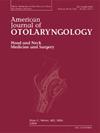Machine learning developed regulatory T cells-related signature for prognosis and immunotherapy benefit in oral squamous cell carcinoma
IF 1.7
4区 医学
Q2 OTORHINOLARYNGOLOGY
引用次数: 0
Abstract
Background
Oral squamous cell carcinoma (OSCC) is one of the most common malignancies with poor clinical outcome. Regulatory T cells (Tregs) have a dual role in maintaining immune homeostasis and suppressing anti-tumor immunity. The role of Tregs related genes (TRGs) in the prognosis of OSCC patients were rarely been reported.
Methods
Integrative analysis procedure containing 10 machine learning methods was used to develop a Tregs related gene signature (TRS) using datasets from TCGA, GSE41613, GSE65858, and GSE117973 cohort. Several predicting scores were used to investigate the performance of TRS in predicting immunotherapy benefit. The biological function of TNFAIP3 was explored by in vitro assay.
Results
The prognostic signature constructed using the LASSO algorithm was identified as the optimal TRS with the highest average C-index of 0.78. TRS served as a prognostic biomarker, with low TRS score correlating with favorable clinical outcome. Specifically, in TCGA dataset, the 1-, 3-, and 5-year AUC values were 0.796, 0.838 and 0.812, respectively. OSCC with low TRS score exhibited higher levels of immune-activated cells and immune-related functions, including CD8+ T, macrophage M1, and cytolytic activity. Low TRS indicated higher PD1&CTLA4 immunophenoscores, higher TMB, higher MSI, lower tumor immune dysfunction and exclusion score, decreased immune escape score, and lower intratumor heterogeneity scores. Additionally, OSCC cases with high TRS score showed elevated cancer-related hallmark score. Knock-down of TNFAIP3 inhibited OSCC cell proliferation.
Conclusion
This research established an optimal TRS for OSCC, which functions as a valuable indicator for forecasting clinical outcomes and assessing potential benefits from immunotherapy.
机器学习为口腔鳞状细胞癌的预后和免疫治疗效果提供了调节性T细胞相关的标记
背景:口腔鳞状细胞癌(OSCC)是临床预后较差的最常见恶性肿瘤之一。调节性T细胞(Tregs)在维持免疫稳态和抑制抗肿瘤免疫方面具有双重作用。Tregs相关基因(TRGs)在OSCC患者预后中的作用鲜有报道。方法采用包含10种机器学习方法的综合分析程序,利用TCGA、GSE41613、GSE65858和GSE117973队列数据集构建Tregs相关基因特征(TRS)。几个预测分数被用来研究TRS在预测免疫治疗获益方面的表现。通过体外实验探讨TNFAIP3的生物学功能。结果LASSO算法构建的预后特征为最佳TRS,平均c指数最高,为0.78。TRS可作为预后生物标志物,TRS评分低与临床预后良好相关。其中,TCGA数据集的1年、3年和5年AUC分别为0.796、0.838和0.812。TRS评分低的OSCC表现出更高水平的免疫活化细胞和免疫相关功能,包括CD8+ T、巨噬细胞M1和细胞溶解活性。低TRS提示较高的pd1 & CTLA4免疫表型、较高的TMB、较高的MSI、较低的肿瘤免疫功能障碍和排斥评分、较低的免疫逃逸评分、较低的肿瘤内异质性评分。此外,TRS评分高的OSCC患者癌症相关标志评分升高。敲低TNFAIP3抑制OSCC细胞增殖。结论本研究建立了OSCC的最佳TRS,可作为预测临床结果和评估免疫治疗潜在获益的重要指标。
本文章由计算机程序翻译,如有差异,请以英文原文为准。
求助全文
约1分钟内获得全文
求助全文
来源期刊

American Journal of Otolaryngology
医学-耳鼻喉科学
CiteScore
4.40
自引率
4.00%
发文量
378
审稿时长
41 days
期刊介绍:
Be fully informed about developments in otology, neurotology, audiology, rhinology, allergy, laryngology, speech science, bronchoesophagology, facial plastic surgery, and head and neck surgery. Featured sections include original contributions, grand rounds, current reviews, case reports and socioeconomics.
 求助内容:
求助内容: 应助结果提醒方式:
应助结果提醒方式:


